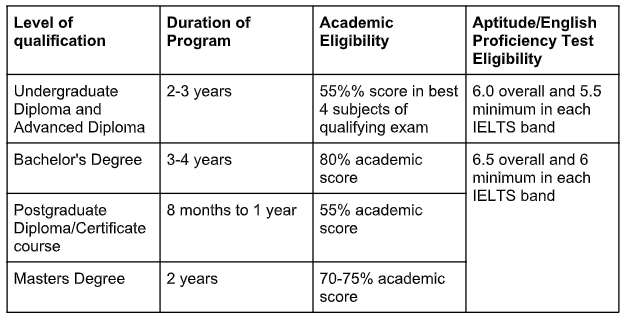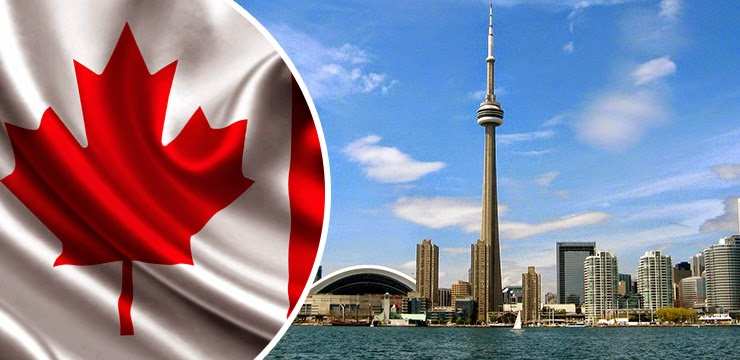What is it like to study in Canada for Indian Students?
If you are dreaming of studying in Canada, you are probably in a state of quandary with lot of questions crossing your mind. Why to choose Canada as a destination? What are the possible challenges? What is the financial cost? Admission and visa requirements? Which scholarships are offered? And so on. Here is an attempt to dust off some doubts from your mind!
Canada ranks 3rd when it comes to percentage of international students in any country. Host to a large Indian diaspora, the North American country is a popular choice among Indian students aspiring to study abroad. According to Canadian High Commissioner in India, as many as 83,540 student permits were issued to Indian nationals in 2017, most of them were enrolled in science and technology programs.
- 26 of Canada’s Universities rank in QS World University Rankings 2019. Several factors work in unison to lure Indian students to the shores of this North American country.
- 494,525 international students study in Canada out of which 25% are Indians. Universities have good acceptance rate of 60.50%.
- Canada aims to up its game in international standard of education, planning to host more than 450,000 foreign students by 2022.
Whether it's the wide array of interdisciplinary programs offered by reputed universities, high academic excellence, affordable tuition fees or the stay back work/residence opportunities, Canada has caught students fancy. The country has opened up faster immigration visa process for students who want to study there through new visa streaming options. Study permit applications of South Asian applicants are prioritised. Moreover, the introduction of Student Direct Stream has reduced visa processing time by no less than 25%, not bad right?
Why one should Study in Canada?
Diverse Range of Courses: Home to some of the most distinguished educational institutes with world class infrastructure and research facilities. Depending on your expertise and personal interest, there are numerous options from STEM to management courses. With immense focus on research and development, the Government of Canada also offers great support to unconventional and specialised areas of study as agriculture, medical science, telecommunication likewise.
Post Study Work Permit: An opportunity that is unavailable in most of the countries, Indian students can apply for Post-Graduation Work Permit Program (PWPP) and the process is quite simple. Students are eligible for a work permit for three years if they have completed their Master’s degree from a Canadian University. The inflow of Indian students to Canada increased further after the introduction of Study Direct Stream programme in 2018.
Permanent Residence: With PWPP, one can get international work experience and apply for permanent residency later. Canada’s newly formed Express Entry Programme work as a major determinant for Indians willing to study and settle in the nation. Once granted PR, candidates can apply for another degree which will be charged domestic fee, that is 1/4th of the tuition fee for international students.
Safe Environment: According to the Global Peace Index 2018, Canada has been ranked as the 6th peaceful country across the globe. With rising incidents of racial crime, students from other countries can feel safe and exercise their rights.
Vibrant Cultural Diversity: Cities have a cosmopolitan nature, with residents being warm and welcoming to foreigners. The Government is open to all nationals and strongly foster cultural diversity. Events, fests, extra-curricular activities conducted throughout the year keeps the campus vibrant and lively.
Affordability: Besides factors mentioned above, affordability is one of the prime reasons Indians opt for studying in Canada. The government spends a huge amount of its budget in the education sector, because of such austerity measures, higher education in Canada is cheap and affordable. Statistically it is 30%-40% cheaper than the US, even at top universities level.
When should I Apply to Study in Canada?
Intake system of the country is divided into three sessions: January, May and September. University applications should begin well in advance by aspirants as universities close their process 5-6 months prior to the intake. January intake closes in August or September. May intake shuts down from September to November, while September intake closes from December to January. Though May is considered to offer less intake with less colleges and universities offering courses in this session.
Application acceptance date and process depends on respective university. Gap years in academic profile of not more than 1 year is entertained that too when justified. Undergraduate aspirants can apply under Student Partner Programme ( SPP), a joint initiative set up in 2009 for indian students for a streamlined admission and visa process. There are currently 47 colleges and universities covered under SPP.
For Masters degree, Canadian universities only accept 16 years of academic education. Students from India are required to take a 1 year Postgraduate or Graduate Certificate Course in Canada to fulfill the required 16 years of education.
In case of MBA programs, most of the universities require, 15 years of academic journey with 1 year of work experience.Along with GMAT score of 580 and above.
A synopsis of the different levels of study in Canada is tabulated below, have a look:

What is the Cost of Studying in Canada?
A major aspect of study abroad expenditure is the tuition fees, along with accommodation, travel, food and health coverage. Canada is a country where studying abroad can be a less expensive affair. The tuition fee in Canada depends upon the course and the university you choose. On an average, it can cost you around CAD 7,0000 (INR 3,79,006) to CAD 29,000 (INR 15,70,170) per annum.

- Many universities in Canada offer in-campus residential facilities to international students. One can opt for in-campus or off-campus residence option. The cost may vary from city to city and number of occupants. On an average, it can range between CAD 8,000 (INR 4,33,150) to CAD 10,000 (INR 5,41,438) (annually).
- In order to study in Canada, one requires a student permit, which serves as a student visa for your stay. The cost of getting a student permit is CAD 150 (INR 8,121).
- Getting Medical insurance before the commencement of their program is mandatory. The average annual cost for medical insurance ranges between CAD 300 (INR 16,243) - CAD 800 (INR 43,315) a year.
- Students having a Social Insurance Number (SIN) are allowed to work 20 hours per week during academic sessions and full-time during vacations. If one chooses to work, the Canadian earned income will be taxable.
- Along with this comes the transportation costs, daily-items costs like groceries and other necessary items.
Scholarships for Indian students to study in Canada
Canadian universities offer a wide range of scholarships to meritorious international students, along with financial assistance from the government and private establishments. Scholarships vary from the course you choose.
- Shastri Indo-Canadian Institute
- Canadian Commonwealth Scholarship and Fellowship Plan
- Ontario Graduate Scholarship Program
- National Research Council of Canada (NRCC)
- Quebec Provincial Government Scholarship
- Ontario Trillium Scholarship
- Partnership Grants by Canada’s Social Sciences and Humanities Research Council.
What are Student Visa requirements in Canada?
As mentioned earlier, international students need to seek a study permit in order to get admission in Canada. Along with it, one requires Temporary Resident Visa (TRV) to get an entry into Canada. Documents required for study permit:
- An acceptance letter from your education institution.
- A valid passport.
- Proof that you are financially able to bear the cost of education.
- A lawful citizen with no criminal record.
- A medical certificate.
- Documentation of student/education loan, if any.
- An authenticating letter for the person or institution providing your funding.
- Proof of funding, if done if you have a scholarship.
United Nations has recognised Canada as one of the best places to live in. Even with increasing amount of immigration from India and the world, Canada has maintained its standards of education. The advance education level, facilities provided by the government and institutions, affordable living, easy lifestyle, and a brand name in itself accepted worldwide, are the factors that has attracted a huge chunk of Indian population. So if you are planning to study in Canada, then it is time for you to start with your application process and make decisions.
To join us on Facebook Click Here and Subscribe to UdaipurTimes Broadcast channels on GoogleNews | Telegram | Signal



